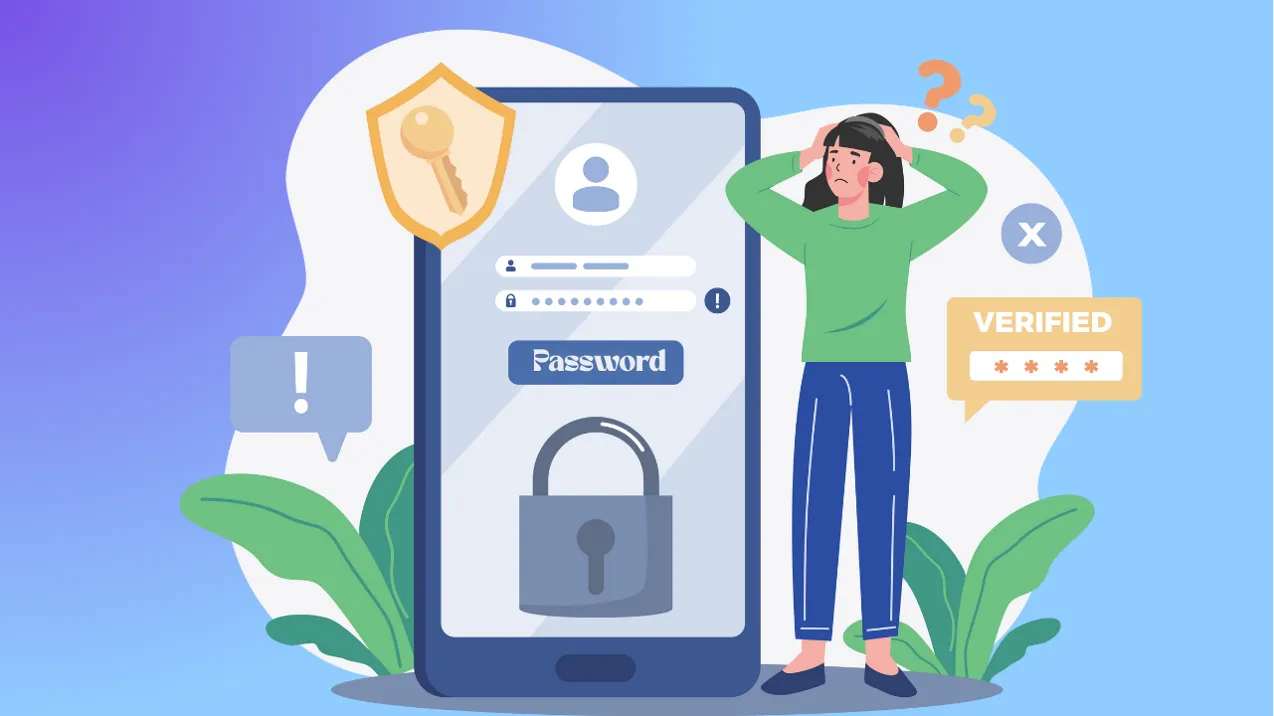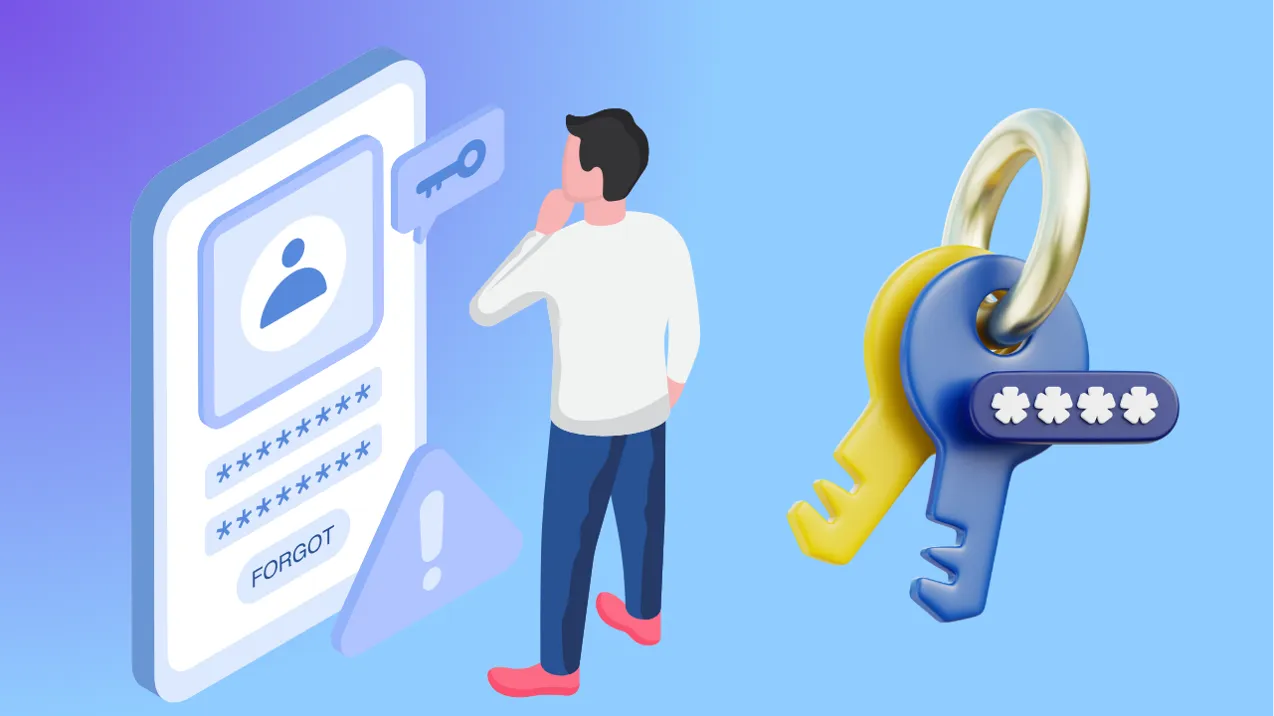
Password creation is one of the most critical aspects of securing your online accounts, but many people make simple mistakes that leave their accounts vulnerable.
One common mistake is using weak or predictable passwords, like “password123” or “abcd789,” which are the first combinations hackers will try when attempting to breach your account.
These weak passwords are easy to crack and often included in data breaches, putting your information at risk. While it might seem convenient to create simple passwords, they do little to protect you from cyber threats.
In this post, we will discuss the most common mistakes people make when creating passwords and using them, and how you can avoid these pitfalls to better protect your online privacy and security.
4 Common Mistakes People Make When Creating Passwords
Creating a password that truly safeguards your privacy and keeps your accounts secure requires more than just a simple approach. People often make common mistakes that compromise their digital security. Here are the key errors to avoid:
Using Weak or Predictable Passwords
Weak or predictable passwords expose your accounts to significant risk, making them prime targets for cybercriminals. Many people still rely on easily guessable combinations like “password123” or “qwerty,” which are among the first attempts attackers will make.
Such weak passwords often appear in data breaches and can be cracked in seconds. To safeguard your online presence, it’s essential to move away from these vulnerabilities. Instead, consider using a super secure and strong password generator to create passwords that are long, complex, and unique.
A free strong password generator online can assist you in crafting a password that’s not only hard to guess but also enhances your overall security.
Incorporating Personal Information
Incorporating personal information into your passwords is a common mistake that can greatly compromise your security. When you use details like your name, birthday, or address, it makes your passwords considerably easier to guess.
Attackers often exploit social media profiles to gather personal information, enabling them to crack your passwords more efficiently. Instead of relying on identifiable information, you should create passwords that feature a mix of numbers, letters, and symbols.
The character length of a strong password is recommended to be at least 12 characters, so aim for a longer length to enhance your security and make it harder for attackers to crack.
Using Easily Guessable Patterns
Many users unwittingly fall into the trap of using easily guessable patterns for their passwords, which greatly undermines their online security. Relying on sequences like “123456” or “abcdef” makes it easy for hackers, as they often test these combinations first.
To protect your accounts, it’s crucial to create a strong password that incorporates a mix of random numbers, symbols, and both uppercase and lowercase letters. This approach not only enhances your password’s complexity but also makes it exponentially harder for anyone to guess.
Choosing Short Passwords
A considerable number of individuals underestimate the risks associated with choosing short passwords, often believing that simplicity equates to convenience.
However, short passwords are quick to guess and provide minimal protection against brute-force attacks. Hackers can use software to try every possible combination, making it essential to choose passwords that are long enough---ideally 12 characters or more.
A short password increases your vulnerability, as it can be cracked in a matter of seconds. To enhance your security, consider using a super strong password generator that guarantees your password has the appropriate length and complexity.
Common Mistakes People Make When Using Passwords and Ways to Avoid Them

It’s not just the creation of passwords that poses a risk; how you use them matters too. Below are mistakes to avoid to keep your accounts secure:
Reusing Passwords Across Multiple Accounts
Reusing passwords across multiple accounts might seem convenient, but it greatly increases your vulnerability to cyberattacks. When one account gets compromised, all others sharing that same password become at risk, creating a domino effect.
This risk escalates considerably for sensitive accounts like your email or online banking. A strong password helps safeguard your privacy and reduces the risk of multiple accounts being compromised from a single breach. So, it’s essential to use unique, complex passwords for each account to enhance your security.
Not Changing Passwords When Needed
Failing to change your passwords promptly can leave your accounts dangerously exposed. Once you suspect a password is compromised or notice unusual activity, immediate action is vital. Ignoring this can result in unauthorized access and significant data breaches.
Regularly updating your passwords is a proactive measure that enhances your security. It’s advisable to change your passwords every 3 months, even if you haven’t experienced any breaches.
Sharing Passwords with Others
While it may seem harmless to share your password with friends or family, this practice opens up your accounts to unnecessary risk.
Trust is not a sufficient safeguard. Never share your passwords, and instead, encourage others to use their own unique passwords.
Storing Passwords Insecurely
Many people make the mistake of storing their passwords insecurely, which can lead to considerable vulnerabilities.
Writing passwords on sticky notes or saving them in easily accessible files makes it easy for unauthorized individuals to gain access to your accounts. This practice undermines your overall security and puts your sensitive information at risk.
Instead, consider using a password manager. These tools encrypt your credentials, ensuring they remain protected from hackers. By securely storing your passwords, you not only enhance your security but also simplify the process of managing multiple accounts.
Take the time to choose a reputable password manager and start safeguarding your passwords effectively. With better storage practices, you can considerably reduce your risk of a security breach.
Failing to Enable Two-Factor Authentication (2FA)
Neglecting to enable two-factor authentication (2FA) greatly weakens your account security.
Relying solely on a password is inadequate in today’s digital landscape, where cyber threats are increasingly sophisticated.
2FA provides that vital extra layer of protection, requiring a second verification step, like a code sent to your phone, before granting access.
This means even if someone steals your password, they can’t access your account without the second factor.
Not Monitoring Account Activity
Even with the added protection of two-factor authentication, account security isn’t foolproof without regular monitoring of your activity. Ignoring this vital step can leave you vulnerable to unauthorized access, even if your passwords are strong.
Regularly check your account activity for any unusual transactions or logins. Many services provide alerts or activity logs that can help you identify suspicious behavior. If you notice anything amiss, act quickly to secure your account. Change your password immediately, and consider enabling additional security measures.
How to know if your password has been compromised?
If you suspect your password may have been exposed, check for signs of unauthorized access, like unfamiliar login locations or unrecognized devices on your account.
You can also use a password robustness tester to check the strength of your password. If you find that your password has been compromised, change it immediately and consider using an encrypted password generator to create a new one.
Is it safe to use public Wi-Fi to log into my accounts?
Is it really safe to log into your accounts over public Wi-Fi? The short answer is no.
While public Wi-Fi is convenient, it’s often insecure, making it easy for hackers to intercept your data. When you log into sensitive accounts, you risk exposing personal information.
To protect yourself, consider using a Virtual Private Network (VPN) that encrypts your connection, offering an extra layer of security. If a VPN isn’t an option, it’s best to avoid accessing sensitive accounts altogether on public networks.
Additionally, enable two-factor authentication (2FA) wherever possible; it adds another barrier against unauthorized access.
Avoid Common Password Mistakes and Strengthen Your Digital Security
In the digital landscape, your password acts as a key to your online fortress. If you’re using easily guessable information or reusing passwords, you’re leaving the door ajar for cybercriminals.
To fortify your defenses, create unique, complex passwords and change them when needed. Stay vigilant by checking if your passwords have been compromised, and avoid logging into sensitive accounts on public Wi-Fi. Secure your digital domain by treating your passwords with the seriousness they deserve.
